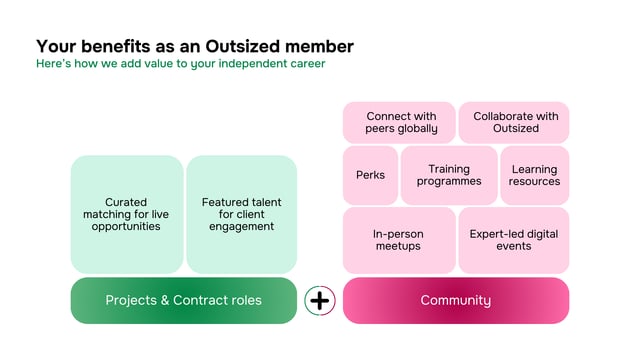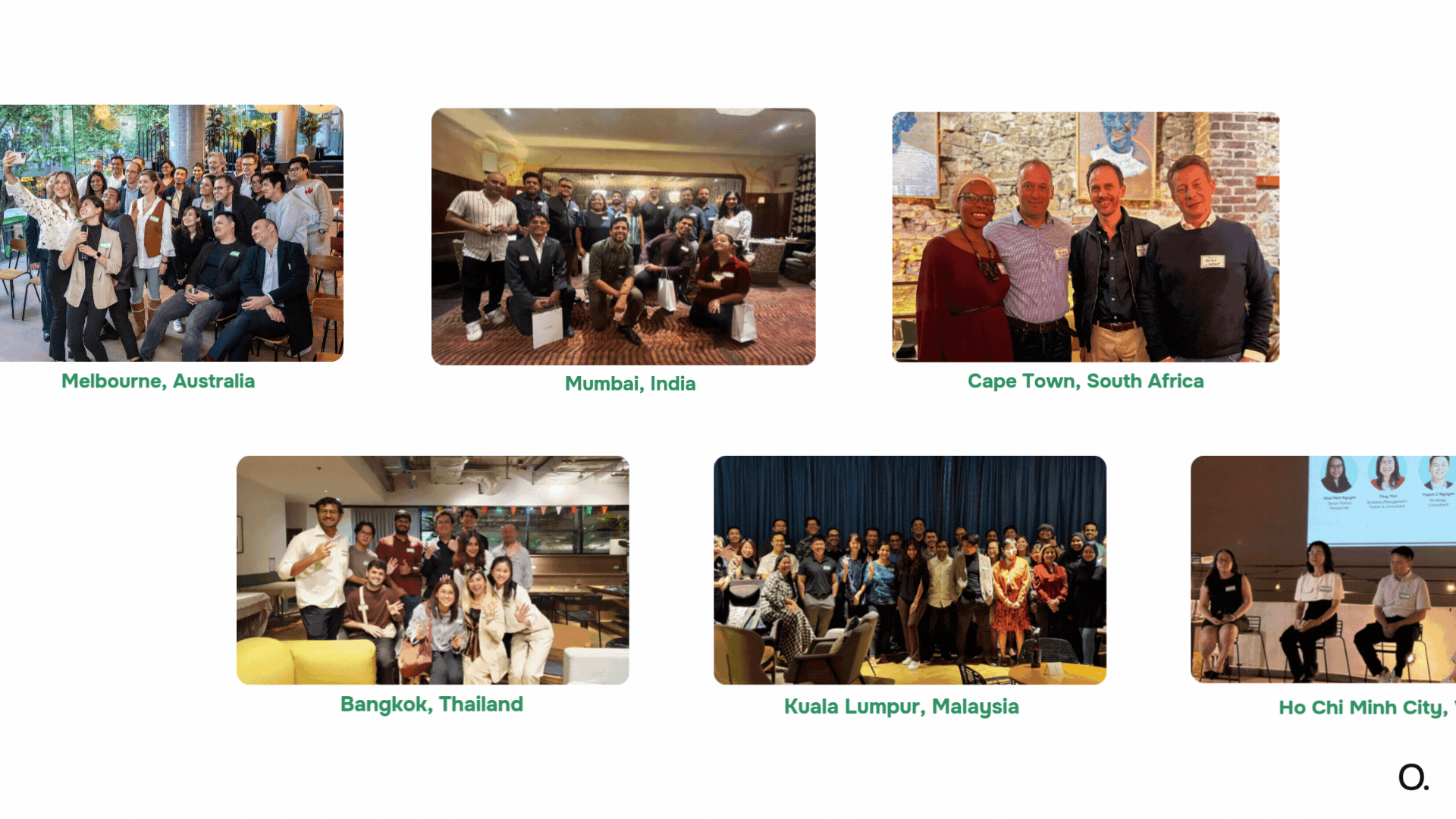You've climbed the ladder at McKinsey, Bain, or BCG, and with each promotion comes a familiar...
Leaving corporate? Here’s why offline Communities matter more than you think (and how to find one that's actually worth it)
The transition from corporate to independent consulting brings immediate relief - no more pointless meetings, no politics, no bureaucratic nonsense. Just you, your expertise, and clients who actually want your help. Freedom at last.
Then week three hits.
You're staring at your laptop in your home office, wrestling with a pricing decision, and realise there's no one to bounce ideas off. No colleague to grab coffee with when you need to think through a tricky client situation. The very systems you couldn't wait to escape? Turns out some of them were actually useful.
Here's what successful independent consultants figure out early: leaving corporate doesn't mean abandoning community. It means rebuilding it - intentionally, strategically, and on your terms. At Outsized, we created our Community to make that easier: to help you interact, network, and build new relationships with professional freelancers and independent consultants from diverse skills, backgrounds, and experiences - growing your independent career but never alone
What corporate gave you that you didn't know you'd miss
Most ex-corporate consultants focus on what they're gaining - autonomy, flexibility, no more performance reviews. What catches them off guard is what they've lost:
- Built-in feedback loops disappeared overnight. That boss who challenged your thinking? Gone. The peer who spotted holes in your logic? No longer exists. Suddenly, you're operating in a vacuum, making decisions without the natural checks and balances that corporate environments provide
- Casual knowledge sharing just vanished. Those impromptu conversations that sparked new ideas? The lunch chat where someone mentioned a framework that perfectly solved your current challenge? These weren't scheduled learning sessions - they were the invisible infrastructure of professional growth
- The emotional safety net vanished completely. When you questioned a decision or felt overwhelmed, you had people around who understood your context. Working alone, these moments of uncertainty can spiral without that natural support system
The consultants who struggle most aren't those lacking technical skills - they're the ones who underestimated how much their corporate environment contributed to their thinking and confidence.
Why offline community beats online groups every time

*A peek at our Community offline meetups across cities
Your first instinct might be joining online communities - Slack groups, LinkedIn networks, Reddit forums. These have their place, but they can't replace what happens when real people gather in the same room.
- In-person conversations have depth that screens can't match. Online discussions tend toward quick answers and surface-level advice. Face-to-face, you get the nuanced conversation that actually helps - the follow-up questions, the shared experiences, the "have you considered..." moments that emerge from natural dialogue. Join our next meetup here
- Trust and referrals grow faster offline. People hire consultants they trust, and trust develops through repeated exposure and genuine connection. When someone meets you at an event, sees how you think through problems in real-time, and watches how you interact with others, they're forming a complete picture of who you are professionally. Dont believe us - read some of the best collaboration stories made through the Community
- Serendipity happens when you least expect it. The most valuable connections often come from unexpected conversations - the person you meet while queuing for coffee who mentions a challenge you've solved before, or the casual chat during a break that reveals a perfect collaboration opportunity
- Physical presence grounds you psychologically. Being around other consultants navigating similar challenges reminds you that uncertainty is normal, that everyone questions their decisions sometimes, and that the problems you're facing aren't unique to you.
Where to actually find communities worth your time (and which ones to skip)
Not all events and communities are created equal. Here's how to tell the difference:
Worth your time:
✅Curated events with application processes (Indie Hackers, Lean In Circles, The Offline Club)✅Skill-specific closed groups (independent strategy consultants, solo PMs, fractional executives)
✅Coworking spaces with strong event calendars and member programming
✅Invite-only dinners, accountability pods, or masterminds that meet regularly
Red flags to avoid:
❌Events that feel too "pitchy" where every conversation turns into a sales presentation
❌Overly broad focus ("entrepreneurs, freelancers, and anyone with a side hustle")
❌LinkedIn networking translated to real life - name tags, elevator pitches, business card competitions
The best events feel like professional family dinners rather than formal networking functions. People share real challenges, offer genuine help, and follow up because they're building lasting relationships, not collecting contacts.
Reframe networking as infrastructure building
Stop thinking about "networking" - that word carries too much baggage. You're building infrastructure - the systems that support your independent practice, just like corporate systems supported your previous role.
Take inventory of what you actually need:
- Reliable people to bounce ideas off when you're stuck (Check out our ConnectX Programs to network and learn from experienced professionals)
- Sources of referrals when your pipeline runs low
- Advisors who can help you navigate tricky client situations
- People who understand your industry and can spot opportunities you might miss
- A support system for the inevitable moments of doubt
- Design your community portfolio strategically. Just like you wouldn't rely on a single client, don't rely on a single community. You might join a skill-specific group for technical development, a local meetup for referrals, and a mastermind for strategic thinking.
- Invest in relationships before you need them. The worst time to build community is when you're desperate for help. Show up consistently when things are going well, contribute to others' success, and build relationships based on genuine mutual support.
You left the company, not a need for community. The difference is that now you get to build it intentionally, connecting with people who share your values and understand your path. That's not just replacing what you lost - it's upgrading it.
Looking to connect with other independent consultants? Join Outsized Community and register for our next meetup happening in Pune, Jakarta, and more. Join other serious practitioners at Outsized Community who are building sustainable independent practices while supporting each other's success

.png?height=200&name=Insight%20articles%20correct%20size%20(4).png)
